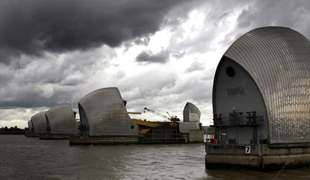Adapt faster to changing climate, Europe warned
29 Apr 2013
By: Fiona Harvey, environment correspondent
Cities around Europe may have to erect flood defences similar to the Thames Barrier as tidal surges become more likely
Cities around Europe may have to erect flood barriers similar to theThames Barrier that protects London from sea surges, as climate change takes hold and leads to the danger of much more destructive storms, floods, heavy rainfall and higher sea levels, Europe's environmental watchdog has warned.
|

|
The effects of climate change will be so far-reaching across the continent that vineyards may have to plant new grape varieties, farmers may have to cultivate new crops and water suppliers look to technology such as desalination in order to cope with the probable effects of more extreme weather. Buildings and infrastructure such as transport, energy and communication networks will also have to be changed.
The warnings come in a report from the European Environment Agency, called Adaptation in Europe. The research found that half of the 32 member countries of the EEA still lack plans to adapt to the effects of global warming, although others have begun to take action.
Jacqueline McGlade, executive director of the EEA, said: "Adaptation is about new ways of thinking and dealing with risks and hazards, uncertainty and complexity. It will require Europeans to co-operate, to learn from each other and to invest in the long-term transformations needed to sustain our wellbeing in the face of climate change."
The EEA has found that the effects of climate change are already being felt across Europe, and more is in store. Even if current efforts to cut global greenhouse gas emissions are successful, there are likely to be further impacts from a changing climate, including more frequent "extreme weather events" such as fiercer storms, heatwaves and periods of heavy rainfall. Average temperatures across Europe have risen, and there is now less rainfall in southern Europe, where much of Europe's agriculture is focused, and more rainfall in northern Europe, where it gives rise to floods.
Monday's report classes the different measures to adapt to climate change as "grey", meaning technological and engineering projects such as river or sea flooding barriers; "green" projects that are based on adapting natural ecosystems, such as changes to farming methods and crops; and "soft" measures which are categorised as policy changes, and measures such as early warning systems for forest fires. All will be needed to ensure Europe can adapt to the changes under way, and although the projects may incur upfront costs, they should result in savings over the longer term.
The Thames Barrier was planned from the 1960s and finished in the 1980s, after the disastrous sea surge and floods of 1953 that claimed hundreds of lives in the UK, and almost 2,000 in the Netherlands. Policymakers in the UK decided that the risk of another such event to London's financial centre and inhabitants was too great to leave them without protection. Since then, the barrier has been raised far more often than had been originally predicted, an increase that is likely to be at least partly due to climate change.
The authors of the report point to the example of the Danube basin, parts of which are being restored to their natural state at a cost of €183m. But the restored areas should provide protection against flooding, which in 2005 cost €396m in damage.
Source:
http://www.cnbc.com/id/100686427

